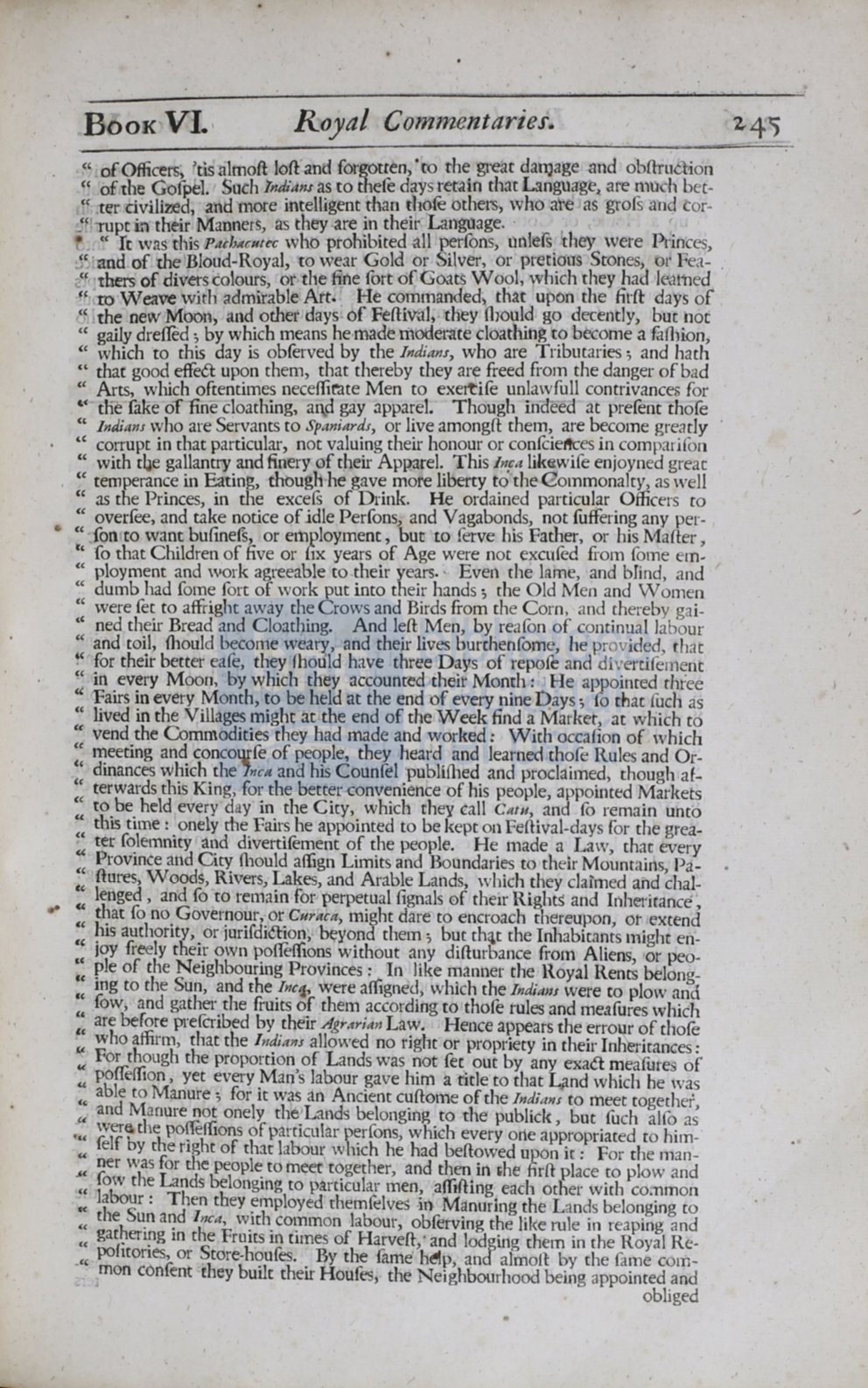

BooK
VJ. ,
R.oyal
Commentaries.
" of
Officer~
'tis almofi:
I~ft
and
forgotren>
·to
the great dat1Jage
.and
obfirutl:ion
'' of the
Gof
pel.
uch
1ndian.r
as to thefe days rerain that LanguClge:t ate mu
h
bet–
" ter civilized and more intelligent than
thofe
others,
who
a e
as
grofs and cor-
-" 111pt
·n their
1
Manners, as
they re
~n.
their
Language.
.
«
Ic:
as
this
Pacluicutec
who prohibtted
.all
perfons, unlefs they
were
Princes,
" and of the Bloud-Royal,
to
wear Gold or Silver, or
pret~orrs
Stones;
r ea–
" thers of divets
colours,
or
the fine fort ofGoats Wool,
which
they had Iemned
'' ro
W
ea'Ve
wirh admirable
Att. He
commanded) that upcn the firll: days
ot
<(
the new Moon, and other days
of
Fefii\ral~
they
fiJoul? go decently, but _not
'' gaily
dreifed ; by which means he
made
moder~te
cloathing
t?
bec<?me
a
fa{}uon,
'' which to this day is obferved by the
Indians,
who are Tnbutanes; and hath
" that good effeet upon them, that thereby they
ar~
freed from the
da~ger
of bad
" Arts which oftentimes neceffirate Men to exert'lfe unlawfull contrivance;
for
~
the fake of line cloathing, and
gay
apparel. Though inaeed
at
prefenc thofe
''
Indians
who are Servants to
Spaniards,
or live arnongfl: them, are become greatly
'' corrupt in that particular, not valuing their honour or
confcie~ces
in comparifon
" with
r e
gallantry and finery of their Apparel. This
ln,ca
lik
wife enjoyned great
'' temperance
in
Eating, though he
gav~
more liberty
t?
the
Co~monalty,
as''
ell
" as the Princes, in the excefs of Drmk.
He
ordained particular Officers to
" overfee, and take notice of idle Perfons, and Vagabonds, not fuffering any per–
" fon
to want bufinefS, or ernployment, but to ferve his Father, or his Mafier,
'' fo
that Children of five or
fix
years of Age were not excufed from fome
m...
" ployment and work agreeable to .their years. Even the lame, and blind, and
" dumb had fome fort of work put into their hands ; the Old Men and Women
" were fet to affright away the Crows and Birds from the Corn, and thereb gai–
" ned their Bread and Cloathing. And left Men, by reafon of continual labour
" and toil, lhould become weary, and thejr lives burchenfcme, he provided
hat:
" for
their better eafe, they (hould have three Days of repafe and divertifement
" in
every Moon,
by
which they accounred their Month: He appoinred
three
'' 'Fairs in every Month, to be held
at
the
end
of every nine Days;
fo
that fuch
as
" lived in the Villages might at the end of theWeek find a Market, at ;vhich to
'' vend the Commodities they had made and worked: With occafion of which
" meeting and conco
fe of people, they heard and learned thofe Rules and Or–
te
dinances which the
nca
and his Counfel ·publifhed and proclaimed, though af–
'' terwards this King,
for
the better convenience
of
his people, appointed Markets
" to be held every
d
y
in
the City, which they
call
Catu,
and
fo
remain unto
cc
this
time:
onely d1e
Fairs
he appointed to be kept on Fefiival-days for the gtea–
cc
ter folemnity and divertifement of the people. He made a Law, that every
" Province and Gty {hould affign Limits and Boundaries to their Mountains, Pa–
,, fiures, Woods, Rivers,
Lakes,
and Arable Lands, which they claimed and chal–
'' lenged , and
fo
to remain for perpetual fignals 0f their Rights and Inheritance
;J
" that
fo
no Governour, or
Curaca,
might dare to encroach thereupon, or extend
cc
his
authority, or jurifdietion, beyond them ; but rh11t the Inhabitants might en-
cc
joy
freely their own poifeffions without any dill:urbance
from
Aliens, or peo–
:: ple of the Neighbouring Provinces
:
In
like
n:ianner the Royal Rents belong-
mg
to che Sun, and the
lnctJ.,
were affigne<l, which the
Indians
were to plow and
" fow, and
gather the fruits of them according to thofe
rules
and meafures which
'' are before prefcribed by their
Agrttrian
Law. Hence appears the
erro~r
of thofe
: who
affirm,
that the
Indians
allowed no right or propriety in their Inh)ttitances:
For though the proportion of Lands was not
fee
out
by
any
exatt meafates
of
Ir<
poffeffion, yet every Man' labour gave
him a
title
to
that Land which
he was
" able to Manure ; for
it
was an Ancient cufl:eme of the
Jndian.f
to
meet togecher
;; and M nure not onely the Lands belonging to the publick, but fuch alfo
a~
.,, wer. the
po~ffions
of particular
p~rfons,
whkh every one appropriated r him–
" felf oy the right of that labour which he had bellowed upon
it:
For the man–
.1<
ner was for the
peopl~
to
meet
t~ether,
and then in 'he firfl: place to plow and
cc
fow
the Lands belonging to
p~rt1cular
men, affi{Hng each other
w
ich common
«
labour: Then they
~mployed
themfelves in Manuring the Lands belonging to
" the
S~n a~d
Inca,
w.1th.
co~mon
labour, obferving the like rule
in
reaping and
"
gat~erl?g
m the Frmts m times of Harvefi, ·and lodging them in
the
Royal Re–
,, pohtones, or Store-houfes. By the fame ht!p, and almoft by
the fame
com-
-
rnon confent
they
built their
Houfes,
the
eighbourhood being appointed and
obliged














